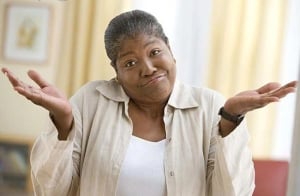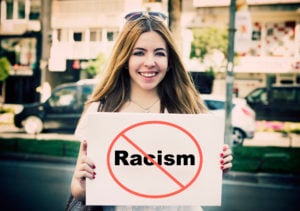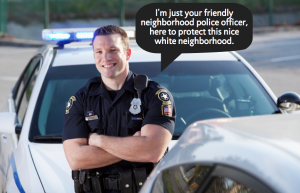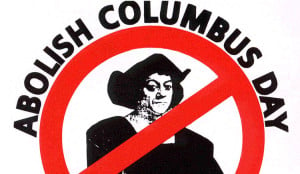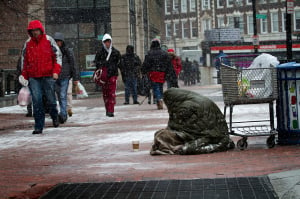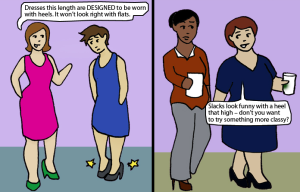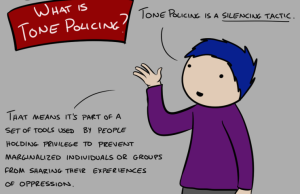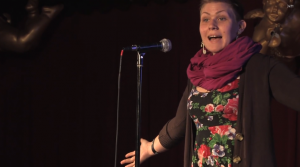Arsenio: Okay, so last night I had a woman named Ernestine Johnson booked on this show to perform spoken word. Unfortunately, I ran out of time, and I was unable to put her on. But after the show, she set this room on fire with a performance for my Arsenio Up Close App. At that moment, at that very moment, I decided to have her on the show tonight to start it off for you all. Ladies and gentleman, please welcome Ernestine Johnson.
Audience: (cheering and clapping)
Ernestine: They say I’m not the average Black girl because I’m so well spoken – poised, full of etiquette. A white man’s token. You know, I remember my ex’s mother telling me, “I didn’t know how I was going to react when he brought home a Black girl, but I like you because you talk so white.”
Well, when did me talking right equate to me talking white? They say I’m not the average Black girl. No, no, no. Not the average Black girl because the pigment of my skin is just a shade lighter than that Black girl over there. You know the Black girl over there. The Black girl with the nappy hair. The Black girls whose elbows can’t skip a day without lotion. Whose hearts and heads are filled up with self-hate and bottled up emotion. The cocoa brown girls who have to face society every day and be tough. ‘Cause no matter how good they straightened their hair, their good is still not good enough.
Oh, see, luckily for me, see, I don’t fall in that category. See, they say I’m not the average Black girl because I speak with so much class. And I don’t have too much, but just enough ass, and not too much, but just enough pizzazz. You know, just a little bit of attitude, because you don’t want to come off as one of those average Black girls and come off as rude.
You know, popping their gum, and shaking their neck. Yeah, because those Black girls get like no respect. But see, luckily for me, see, I get a pass. Because the melanin in that skin matches that brown paper bag, and my father, brother, and men that I date pants don’t sag. And when I speak, my tongue pronounces every syllable.
And the combed part down the middle of my hair is naturally visible. Oh, and it must be a weave, she must be a mix, because we all know the average Black girl ain’t got that good (censored).
Or when I walk into a room full of white men, they all stare. It must be the long lengths of my unaverage Black girl hair. See, they say I’m not the average Black girl because I corrected the professor when he used the word “conversate.” Converse. The word is “converse.” And in case you didn’t get the memo, there are now eight – not nine – planets in the universe. And when you’re watching the numbers on your stocks move up and down, remember Oklahoma. And a small town. Where one of the first Wall Streets was a Black Wall Street that got mysteriously burned down.
Oh, they say I’m not the average Black girl. Well, let’s flip the script and rewind this (censored), repaint the lines that have been blurred over time. Because the average Black girl that I know? See, the average Black girl I know made 19 trips through the underground railroad to free the slaves. Sat on segregated buses, refused to get up, and paved new ways. See, the average Black girl that I know? The average Black girl that I know were Egyptian queens like Hatshepsut and Nitocris who were ruling dynasties and whole armies of men. And excuse me while I set fire to this poem and my pen because I am tired. Tired of the stereotypes Black girls have fallen into because of American mentality. Oh, but not half as tired as Ella Baker. Dianne Nash. Septima Pointsette Clark. I am sick and tired of being sick and tired, Miss Fannie Lou Hamer. Daisy Bates, Anna Arnold Hedgeman, and Dorothy Heights are far more tired than I am.
But do you think the ones who say I am not the average Black girl even give a damn? No. So pardon me if I can’t openly accept your compliments. Pardon me if I can’t openly accept your compliment. It’s just the average Black girl that I know, the average Black girl that I know has courage that surpassed her every year, and fought for justice and equality year after year. So as I construct these words, pardon me as I shed a tear, because I’m not half the Black girl she was.
I am not half the Black girl she was. See, there’s a minor clause. See, she was out there fighting, breaking, and changing laws. So I bow down to my Black queen standing in the merit of her work. And as America’s society continuously throws these supercilious words unto me, I say no. I’m not the average Black girl. I can only aspire to be.
Thank you.
Audience: (cheering and applause)
Arsenio: That’s Ernestine Johnson.
Ernestine: Thank you.
Arsenio: We’re busy.






